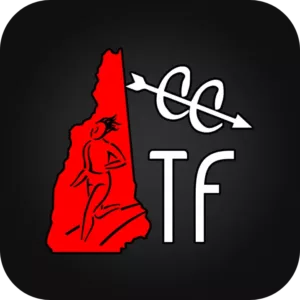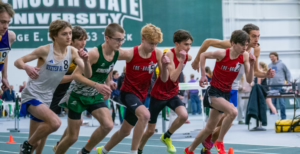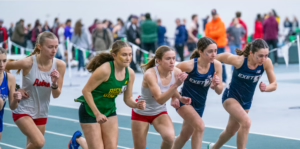Tradition…Tradition!
By Scott McGrath (1st Year Head Coach)
As I’ve taken on the boys’ coaching role at Oyster River, I have kept in the back my mind the fact that I’m a newcomer to a team with traditions and expectations for what a cross country season entails. The team has had a lot of success as a product of their approach to training and as well as their dynamic. As such, it is important to me that I preserve a lot of what has made the squad successful as well as unique. For us, traditions have included things like spaghetti dinners the nights before meets, meeting in the multi-purpose room to start practice, retreating to Barrington for preseason camp, etc. Tradition is so important to teams that drastic or heavy-handed changes to might result in confusion or even rebellion for a new coach! So, I have been wary of unnecessarily changing up the routine. I have made it a point for anything new or contrary to past years to be meaningful and well-reasoned, while everything else about the team I have aimed to preserve.
 Things we have continued include spaghetti dinners (Spags) the night before meets, dynamic warm-up drills before every run, a 3-night training camp in Barrington, NH, prior to the start of school. More often than removing aspects of training from the team, I have found myself mostly adding new elements. Everything new I believe is essential to long-term success as a distance runner. For example, I set an expectation that we would be able to complete 9 minutes of plank exercises by the end of preseason. On the first day of practice, the boys heard the expectation and were panicked. “That’s impossible!” was the general consensus. By the end of camp, the group completed their 9 minutes in addition to several other exercises. We also moved the traditional Wednesday tempo run to Thursday and have introduced new elements to the session. Moving a key workout day one day closer to the typical competition day (Saturday) may have been intimidating for some runners, but the team has embraced it with great results thus far.
Things we have continued include spaghetti dinners (Spags) the night before meets, dynamic warm-up drills before every run, a 3-night training camp in Barrington, NH, prior to the start of school. More often than removing aspects of training from the team, I have found myself mostly adding new elements. Everything new I believe is essential to long-term success as a distance runner. For example, I set an expectation that we would be able to complete 9 minutes of plank exercises by the end of preseason. On the first day of practice, the boys heard the expectation and were panicked. “That’s impossible!” was the general consensus. By the end of camp, the group completed their 9 minutes in addition to several other exercises. We also moved the traditional Wednesday tempo run to Thursday and have introduced new elements to the session. Moving a key workout day one day closer to the typical competition day (Saturday) may have been intimidating for some runners, but the team has embraced it with great results thus far.
One final tradition worth mentioning is the varsity selection process. In the past, an objective meritocracy has directed the decision-making process for varsity. The process boils down to awarding the varsity positions at the upcoming race based on each runner’s performance at the previous one. Sounds simple, right? I wish it was.
While obviously I want the kids who have earned their position to race on  varsity, every coach has their own view of what “earning your spot” entails. We have a large squad, each with nuance to their training and racing. The fastest 7 at the previous meet just isn’t always the best choice for varsity. For example, I have kept out our top runner for our first two meets, but I believe he has earned his varsity spot via workouts and last year’s racing results. Clearly he shouldn’t have to spend a weekend in the JV race to earn his advancement to varsity. That choice is easy. Then, I had a senior who was sick during our first meet and finished around 10th for the team, yet I believed he earned his varsity position this past weekend based on summer training, and so he ran varsity at Hollis (and scored for us!).
varsity, every coach has their own view of what “earning your spot” entails. We have a large squad, each with nuance to their training and racing. The fastest 7 at the previous meet just isn’t always the best choice for varsity. For example, I have kept out our top runner for our first two meets, but I believe he has earned his varsity spot via workouts and last year’s racing results. Clearly he shouldn’t have to spend a weekend in the JV race to earn his advancement to varsity. That choice is easy. Then, I had a senior who was sick during our first meet and finished around 10th for the team, yet I believed he earned his varsity position this past weekend based on summer training, and so he ran varsity at Hollis (and scored for us!).
Finally, I held out two runners at Hollis who scored at our first meet. The two runners who stepped up and filled the varsity positions today ran well In their last race, each runner has finished in the varsity scoring! Assuming all runners are ready to go next weekend, who deserves varsity? The ones who run the faster repeats in practice? What a horrible message to teach kids about training. Should seniority play a role in the decision? What I’ve come to realize and appreciate more is that an “objective meritocracy” isn’t necessarily “fair” or the best approach when making varsity decisions.











